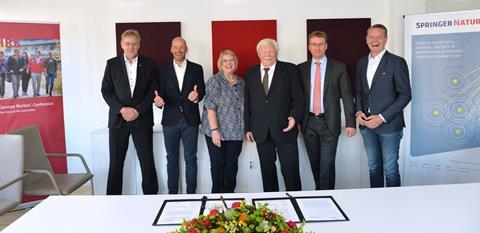Springer Nature has reached an open access publishing deal with 700 German research universities, but it faces some pushback
The academic publishing powerhouse Springer Nature has reached what it is touting as ‘the world’s most comprehensive open access agreement’ with a consortium of nearly 700 research universities in Germany. But there is some pushback to the arrangement.
The agreement, known as Project Deal, was announced on 23 August and will be finalised later this year. It specifies that these German member institutions will be able to publish open access (OA) in both Springer Nature’s fully OA journals and its 1,900 hybrid journals, at least for the two years from 2020 to 2022. The deal is expected to see more than 13,000 open access articles from German researchers published each year.
There will be a ‘publish and read’ (PAR) component to the deal, which will be reflected in a per-article PAR fee of €2750 (£2480). Springer Nature will offer the participating institutions a 20% discount on the list price for some OA journals, and list price increases of article processing charges can rise by up to 3.5% per journal per year. Interestingly, this PAR element of the agreement does not include Nature and its sister journals.

Daniel Ropers, the CEO of Springer Nature, emphasised that the deal enables German scientists to publish OA with his company’s journals, regardless of the size of their institutions, their scientific discipline or whether grant funding has been available. The Max Planck Society’s president, Martin Stratmann, went further and said the agreement marks ‘a significant milestone in the move to liberate scholarship from the subscription paywalls that have been hampering the work of scholars and scientists in our digital age for far too long.’
An ‘absolute minefield’
Not everyone is enthusiastic, however. Peter Murray-Rust, a chemist at the University of Cambridge who champions open access publishing, calls the new arrangement ‘hugely expensive’ and ‘administratively heavy’, and he describes it as ‘a total fragmentation’ of scientific publishing. ‘This might work well for German academics in negotiations with one particular publisher, but it doesn’t necessarily translate to another type of publisher in another country – you can see an absolute minefield of deals being set up.’
Further, Murray-Rust argues that by omitting Nature, and other flagship scientific journals, the deal solidifies the research publishing scene to major commercial players and rich countries, and creates a glory-based industry rather than a knowledge dissemination mechanism. ‘These are glory journals, or high-impact journals, and they can probably charge more,’ he tells Chemistry World. ‘It is purely a marketing ploy.’
Meanwhile, Peter Suber, who directs Harvard University library’s office for scholarly communication, recalls that Elsevier in the past was unable to reach negotiation on a similar agreement with Project Deal. ‘Springer Nature is showing more flexibility than Elsevier, and more willingness than Elsevier to meet the needs and interests of universities,’ he says.
As an example of an alternative OA publishing model, Murray-Rust points to a new approach in Latin America, known as AmeliCA, which was launched last year. Led in part by the United Nations Educational, Scientific and Cultural Organization (Unesco), AmeliCA is centred on a non-profit publishing model and controlled by an inter-institutional academy. It involves universities and scientific journals sharing a common infrastructure of software, tools, hosting and training services.
This article was updated on 2 September 2019. A typo in the final paragraph referred to Project Deal, rather than AmeilCA, and a sentence stating that the Project Deal agreement could act as a stepping stone to other OA models was removed.












No comments yet